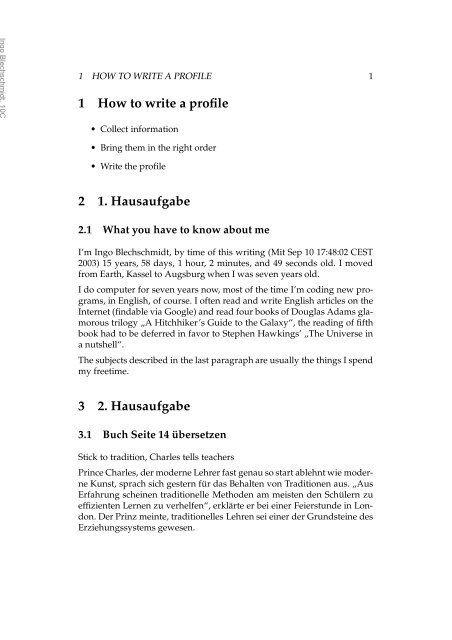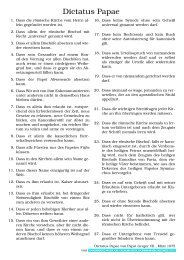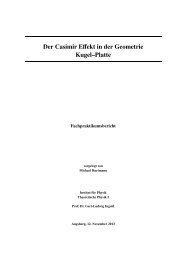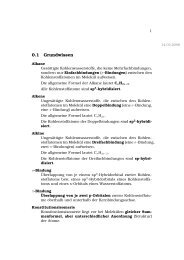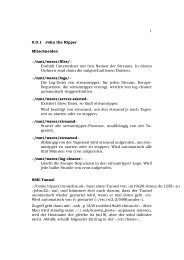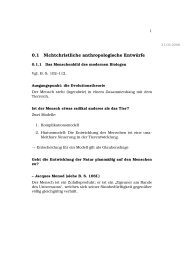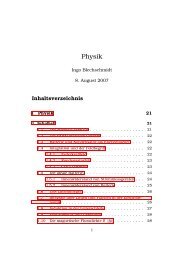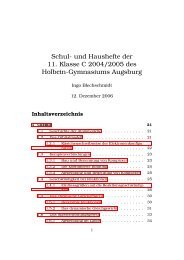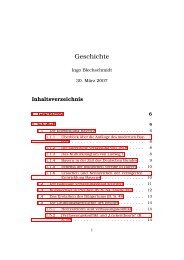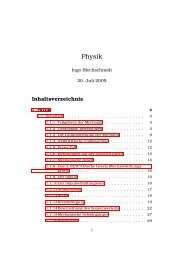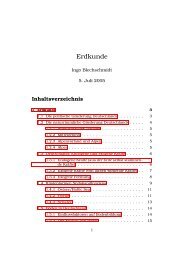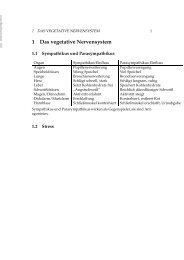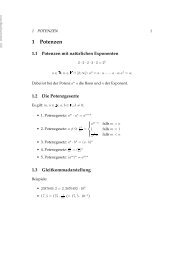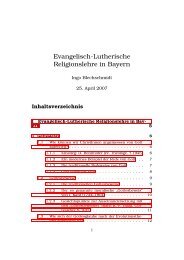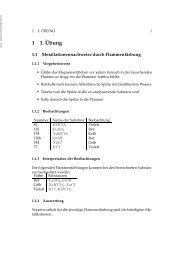1 How to write a profile 2 1. Hausaufgabe 3 2. Hausaufgabe
1 How to write a profile 2 1. Hausaufgabe 3 2. Hausaufgabe
1 How to write a profile 2 1. Hausaufgabe 3 2. Hausaufgabe
You also want an ePaper? Increase the reach of your titles
YUMPU automatically turns print PDFs into web optimized ePapers that Google loves.
Ingo Blechschmidt, 10C<br />
1 HOW TO WRITE A PROFILE 1<br />
1 <strong>How</strong> <strong>to</strong> <strong>write</strong> a <strong>profile</strong><br />
• Collect information<br />
• Bring them in the right order<br />
• Write the <strong>profile</strong><br />
2 <strong>1.</strong> <strong>Hausaufgabe</strong><br />
<strong>2.</strong>1 What you have <strong>to</strong> know about me<br />
I’m Ingo Blechschmidt, by time of this writing (Mit Sep 10 17:48:02 CEST<br />
2003) 15 years, 58 days, 1 hour, 2 minutes, and 49 seconds old. I moved<br />
from Earth, Kassel <strong>to</strong> Augsburg when I was seven years old.<br />
I do computer for seven years now, most of the time I’m coding new programs,<br />
in English, of course. I often read and <strong>write</strong> English articles on the<br />
Internet (findable via Google) and read four books of Douglas Adams glamorous<br />
trilogy „A Hitchhiker’s Guide <strong>to</strong> the Galaxy“, the reading of fifth<br />
book had <strong>to</strong> be deferred in favor <strong>to</strong> Stephen Hawkings’ „The Universe in<br />
a nutshell“.<br />
The subjects described in the last paragraph are usually the things I spend<br />
my freetime.<br />
3 <strong>2.</strong> <strong>Hausaufgabe</strong><br />
3.1 Buch Seite 14 übersetzen<br />
Stick <strong>to</strong> tradition, Charles tells teachers<br />
Prince Charles, der moderne Lehrer fast genau so start ablehnt wie moderne<br />
Kunst, sprach sich gestern für das Behalten von Traditionen aus. „Aus<br />
Erfahrung scheinen traditionelle Methoden am meisten den Schülern zu<br />
effizienten Lernen zu verhelfen“, erklärte er bei einer Feierstunde in London.<br />
Der Prinz meinte, traditionelles Lehren sei einer der Grundsteine des<br />
Erziehungssystems gewesen.
Ingo Blechschmidt, 10C<br />
4 3. HAUSAUFGABE 2<br />
Er hat seine Bedenken über Schulen schon früher veröffentlicht. Sogar die<br />
Leute in seinem eigenen Büro könnten nicht richtig Englisch sprechen<br />
oder schreiben, bemängelte er einst. „Alle Briefe, die von meinem Büro<br />
aus versendet werden, muss ich selbst korrigieren – weil Englisch als sehr<br />
schwer bekannt ist.“.<br />
„Schlechte wirtschaftliche Umstände sollten nicht eine Entschuldigung für<br />
Versagen sein“, sagte er gestern weiterhin. „Wie ich selbst sehe, wenn ich<br />
Schulen in einigen der ärmsten und am meisten benachteiligten Viertel<br />
von Städten besuche, schließt Armut nicht Vortrefflichkeit und Errungenschaften<br />
voneinader aus.“.<br />
3.<strong>1.</strong>1 Verbesserung<br />
Haltet an der Tradition fest, rät Charles den Lehrern<br />
Prinz Charles, der neumodische Lehrer fast genau so start ablehnt wie moderne<br />
Architektur, sprach sich gestern für das Behalten von Traditionen<br />
aus. „Aus Erfahrung scheinen traditionelle Methoden wirklich am meisten<br />
den Schülern zu effizienten Lernen zu verhelfen“, erklärte er bei einer<br />
Feierstunde in London. Der Prinz meinte, traditionelles Lehren sei einer<br />
der Grundsteine des Erziehungssystems.<br />
Er hat seine Bedenken über Schulen schon früher veröffentlicht. Sogar<br />
die Leute in seinem eigenen Büro könnten nicht richtig Englisch sprechen<br />
oder schreiben, klagte er einst. „Alle Briefe, die von meinem Büro aus versendet<br />
werden, muss ich selbst korrigieren – weil Englisch so verdammt<br />
schlecht gelehrt wird.“.<br />
„Schlechte wirtschaftliche Umstände sollten nicht eine Entschuldigung für<br />
Versagen sein“, sagte er gestern weiterhin. „Wie ich selbst sehe, wenn ich<br />
Schulen in einigen der ärmsten und am meisten benachteiligten Gegenden<br />
von Städten besuche, schließt Armut nicht vortreffliche Errungenschaften<br />
voneinader aus.“.<br />
4 3. <strong>Hausaufgabe</strong><br />
4.1 Explain our school system<br />
[<strong>to</strong> be included in a letter]
Ingo Blechschmidt, 10C<br />
5 4. HAUSAUFGABE 3<br />
In your last letter, you asked about how our school system works. So, here’s<br />
the answer:<br />
We have four different types of schools: The „Grundschule“, the „Hauptschule“,<br />
the „Realschule“, and the „Gymnasium“.<br />
We start learning at the Grundschule with 6 years. Usually, we stay there<br />
four years, whereat we aren’t marked in the first two years. With the<br />
beginning of the third class, we get marks, from 1 (very good) <strong>to</strong> 6 (very<br />
bad).<br />
The fourth’s class’ average mark decides if we are allowed <strong>to</strong> go <strong>to</strong> a Gymnasium:<br />
If the average is higher than 2,34, we have <strong>to</strong> go <strong>to</strong> a Hauptschule<br />
or a Realschule.<br />
At both the last mentioned schools, you are „free“ after another 5 years of<br />
learning and can begin <strong>to</strong> learn a job.<br />
At a Gymnasium you have <strong>to</strong> study until you’re in the 13th class, e.g. 9<br />
more years. When you pass the Gymnasium’s last exam, you may go <strong>to</strong> a<br />
university and revolutionize the world with your brilliant ideas :-).<br />
You should also know that we may have <strong>to</strong> repeat a year, if we were <strong>to</strong>o<br />
bad in at least one subject (note that you can even fail in subjects like religious<br />
education or sports). If you failed two times, you will have <strong>to</strong> go off<br />
from school most likely.<br />
[normal blabla of the letter]<br />
5 4. <strong>Hausaufgabe</strong><br />
5.1 Buch Seite 12, Aufgabe 6a<br />
„My name is Norbert Werner. I was born (Ich werde nicht jetzt geboren<br />
sondern ich wurde früher geboren) in Augsburg, but I’ ve been living<br />
(falsches Tempus) near Austin, the capital of Texas, for one year (since definiert<br />
einen Zeitpunkt, for dagegen einen rückwärtigen Zeitraum).<br />
I’m 15 years old (das old ist schon wichtig) and I go <strong>to</strong> school (den Artikel<br />
bei school weglassen) in Austin. My favorite (in BE müsste es favourite<br />
heißen) subjects are biology and his<strong>to</strong>ry. But American his<strong>to</strong>ry (American<br />
ohne Artikel) is quite hard for me. I’m going <strong>to</strong> become a (a muss mit)<br />
doc<strong>to</strong>r when I’ll have left school (falscher Satzbau, falsches Tempus). That<br />
has been (falsches Tempus) my wish since I was a boy, because I’m really
Ingo Blechschmidt, 10C<br />
6 5. HAUSAUFGABE 4<br />
interested in (falscher Satzbau) medicine (Artikel bei medicine weglassen).<br />
In my free time I’m mainly interested (selber Satzbaufehler) in cars and<br />
sports. At school I enjoy taking part (Nicht-Verwendung des Gerundiums)<br />
in track-and-field events. I’m also in the drama club. Next month we’ll do<br />
(Nicht-Verwendung des Futurs) a play by (Merke: from = of ) Tennessee<br />
Williams. We’re working (falsches Tempus) very hard (<strong>1.</strong> bedeutet hardly<br />
kaum und <strong>2.</strong> brauchen wir hier ein Adverb) on the play at (at = on) the<br />
moment.“<br />
6 5. <strong>Hausaufgabe</strong><br />
6.1 Material E10081<br />
<strong>1.</strong> Wenn ich ein Wahlfach wählen müsste, würde ich Fußball nehmen.<br />
If I had <strong>to</strong> choose an optional subject, I would take football.<br />
<strong>2.</strong> Wenn ich mehr Taschengeld bekommen würde, würde ich meinen<br />
Englischlehrer bestechen.<br />
If I got more pocket money, I would bribe my English teacher.<br />
3. Ich hätte den Test leicht bestehen können, wenn ich die Bedingungssätze<br />
wiederholt hätte.<br />
I could have passed the test easily, if I had revised conditional-sentences<br />
again.<br />
4. Ich hätte keinen Schnupfen bekommen, wenn ich nicht im Adamskostüm<br />
zu dieser Party gegangen wäre.<br />
I wouldn’t had caught a cold, if I hadn’t gone <strong>to</strong> Egon’s party in my birthday<br />
suit.<br />
5. Wenn ich meinen Buss verpasse, fahre ich mit dem Rad zur Schule.<br />
If I miss my bus, I’ll go <strong>to</strong> school by bike.<br />
<strong>1.</strong> If I had one million dollars, I would spend them <strong>to</strong> free software projects of<br />
the Free Software Foundation.<br />
<strong>2.</strong> If I had freed the bottle imp, I would have experienced nothing.
Ingo Blechschmidt, 10C<br />
7 6. HAUSAUFGABE 5<br />
7 6. <strong>Hausaufgabe</strong><br />
7.1 Buch Seite 10, Aufgabe 1<br />
a) Look at the comic strip quickly. What does the boy want?<br />
The boy wants <strong>to</strong> have a parental excuse from his father.<br />
b) Use these words <strong>to</strong> fill in the eight gaps: for, have <strong>to</strong>, <strong>to</strong>, want <strong>to</strong>, what<br />
• <strong>1.</strong> for<br />
• <strong>2.</strong> <strong>to</strong><br />
• 3. want <strong>to</strong><br />
• 4. <strong>to</strong><br />
• 5. what<br />
• 6. have <strong>to</strong><br />
• 7. want <strong>to</strong><br />
• 8. have <strong>to</strong><br />
c) Choose one of these sentences for the empty bubble at the end, or,<br />
better still, make up your own sentence and read it <strong>to</strong> the class.<br />
• Don’t you like your teacher?<br />
• School taught me what I wanted <strong>to</strong> know.<br />
• Welcome <strong>to</strong> the world. Welcome <strong>to</strong> the real world ;-). (FAV)<br />
d) What is the boy’s opinion of school? Do you agree?<br />
He thinks of school as a silly thing designed <strong>to</strong> have he postpone<br />
things he actually want <strong>to</strong> do.<br />
I don’t agree, because in our school are many floors. On these floors,<br />
there are many doors. These doors lead <strong>to</strong> many rooms. To classrooms.<br />
But one door is special: It leads <strong>to</strong> the source, the<br />
Infothek
Ingo Blechschmidt, 10C<br />
8 7. HAUSAUFGABE 6<br />
8 7. <strong>Hausaufgabe</strong><br />
8.1 Buch Seite 12, Aufgabe 6b<br />
<strong>1.</strong> Don geht nie in die Kirche, obwohl er mit seinen Eltern in einem<br />
neuen Haus gegenüber der Kirche an der 77. Straße wohnt.<br />
Don never goes <strong>to</strong> church, although he lives with his parents in a new house<br />
opposite the church at the 77. street.<br />
<strong>2.</strong> Wenn Don die Schule verlässt, will er an die Universität gehen. Er<br />
interessiert sich sehr für die moderne Literatur.<br />
When Don leaves school, he want’s <strong>to</strong> go <strong>to</strong> university. He’s very interested<br />
in modern litarature.<br />
3. Dons Mutter ist Professorin. Sie lehrt an der Universität in Austin.<br />
Sein Vater arbeitet als Lehrer.<br />
Don’s mother is a professor. She teaches at the university at Austin. His<br />
father works as a teacher.<br />
4. Als Don gestern im Internet gesurft hat, hat er eine sehr interessante<br />
Information über das deutsche Schulsystem gefunden, die er für die<br />
morgige Deutschstunde brauchen kann.<br />
When Don was surfin’ the Net yesterday, he found a very interesting information<br />
he can use for the German lesson <strong>to</strong>morrow about the German<br />
school system.<br />
9 8. <strong>Hausaufgabe</strong><br />
9.1 Buch Seite 17<br />
a) Write down your impressions of the School Board. Then compare<br />
your ideas with what others in your class have written. I think, even if<br />
the School Board is important for Britain’s school system, it’s unfair against<br />
the students who have <strong>to</strong> „defend“ themselves against many officers. But it’s<br />
a simple central-organized system which seems <strong>to</strong> have success.<br />
b) A closer look at the text:
Ingo Blechschmidt, 10C<br />
9 8. HAUSAUFGABE 7<br />
• <strong>1.</strong> What are the most important moments in the above extracts?<br />
Why? Paul’s saying „I’m sort of organized now. Earning and learning.<br />
Hey, just thought of that, sounds good.“ is very important, because<br />
at this point Paul’s philosophy of live becomes clear: He doesn’t<br />
plan, he simply does nothing.<br />
• <strong>2.</strong> In informal English people sometimes leave out certain words<br />
at the beginning of a sentence if the meaning is clear without<br />
them. What examples can you find in the truancy officer’s speech?<br />
What are the „missing“ words?<br />
– You [are] alone all day?<br />
– [full sentence] Sewing.<br />
– [full sentence] Any math?<br />
– [full sentence] School math.<br />
– [full sentence] Day before<br />
yesterday?<br />
– You [are] trying <strong>to</strong> be smart?<br />
– [full sentence] Geography.<br />
– [full sentence] Regina.<br />
– You’re breaking the law, [do]<br />
you understand?<br />
– [full sentence] Not fiction!<br />
– What textbooks [are]<br />
you[AWAY: ’re] reading?<br />
– [full sentence] Social studies,<br />
his<strong>to</strong>ry, written expression.<br />
– [Are] those the books [you<br />
spoke of]?<br />
– [full sentence] „The Chevy<br />
Owner’s Manual“ and „The<br />
Reader’s Digest Guide <strong>to</strong> Sewing“.<br />
• 3. Why does Paul use phrases like „I guess“, „I mean“, „I bet“,<br />
„on the whole I think“, „kinda“, „sort of“ when the School Board<br />
interviews him? Those phrases are part of his philosphy of live: Simply<br />
do nothing and wait what happens. By speaking informal, he demonstrates<br />
his disinterest.<br />
• 4. Say in a few words what makes Paul’s case strong and what<br />
makes it weak. Paul’s abilities are only of practical nature, he doesn’t<br />
know theory much. He doesn’t even want <strong>to</strong> know theory.<br />
• 5. <strong>How</strong> do you think the chairman of the Board will vote? Why?<br />
<strong>How</strong> would you vote? Why? I think the chairman will vote against<br />
Paul, because even he’s talented in the practical sec<strong>to</strong>r, he has <strong>to</strong> know<br />
theory and do his homework. I would vote against Paul, <strong>to</strong>o, because<br />
of the same reasons stated in the last sentence.
Ingo Blechschmidt, 10C<br />
10 9. HAUSAUFGABE 8<br />
10 9. <strong>Hausaufgabe</strong><br />
10.1 School<br />
In German schools, you learn the theory of things, unlike, for example in<br />
countries which weren’t as bad as we in PISA test’s ranking. In Germany,<br />
you learn how things work, but not how <strong>to</strong> use them. A good example<br />
for this assumptions is the physical education: You learn thermodynamics<br />
and at the beginning of your education, but such basic things like electricity,<br />
the foundations<strong>to</strong>ne of our society, are taught in the 10th class.<br />
But, on the other hand, you can’t get experience from school, because otherwise,<br />
life would be meaningless. And you need theory <strong>to</strong> understand the<br />
practical things, like it’s stated in the popular drama „Die Physiker“: „Don’t<br />
use things you don’t understand.“ If you had no knowledge about theory,<br />
you could use many things. But if problems arise, you have no idea how <strong>to</strong><br />
fix them, for example in the computer sec<strong>to</strong>r: You do know how <strong>to</strong> <strong>write</strong> a<br />
little text in your little text processing program. But do you know what <strong>to</strong><br />
do if the neat MSBlaster worm gets you?<br />
(174 words)<br />
11 10. <strong>Hausaufgabe</strong><br />
1<strong>1.</strong>1 Buch Seite 28 übersetzen<br />
Der elf Jahre alte Simon Bradford schaut zur Vordertür der Wohnung seiner<br />
Eltern, die sich im ersten S<strong>to</strong>ck befindet, in Ost-London, befor er herunter<br />
zur Diele geht und eine Kugel Schokoladen-Eins in sich hineinschlingt.<br />
Jedesmal, seit er zusammen mit seiner 48-jährigen behinderten Mutter<br />
Anita und seinem Vater Raymond, 46 Jahre alt, vor vier Jahren in den<br />
Wohnungsblock umgezogen ist, war Simon das Opfer von Schikanierungen<br />
und Einschüchterungen. Er ist häufiger als ein mal mit einem Kricketschläger<br />
geschlagen worden. Als er einmal zur Schule gefahren ist, wurde er<br />
sogar von seinem Fahrrand herunterges<strong>to</strong>ßen.<br />
Gestern hat der „High Court“, das höchste Gericht von England, entschieden,<br />
dass „Tower Hamlets“, ein Standtviertel von London, die Plicht hat,<br />
die Unterbringung Simons an einem sicheren Platz in Betracht zu ziehen.<br />
Diese bahnbrechende Entscheidung war das Ergebnis des Kampfes der
Ingo Blechschmidt, 10C<br />
12 1<strong>1.</strong> HAUSAUFGABE 9<br />
Familie gegen eine .... Als sie an einem Tag des Julis 1995 nach Hause gekommen<br />
sind, um festzustellen, dass „armer Weißer“ auf die Haustür geschrieben<br />
wurde, haben die Bradfords entschieden, dringend einen neue<br />
Wohnung zu beantragen. Da regelmäßig Exkremente durch den Briefschlitz<br />
gesteckt wurden und das Au<strong>to</strong> 18 mal aufgeschlitzt wurde, ist das Leben<br />
für die Bradfords unertragbar geworden. Richter Kay hat dem Stadtviertel<br />
angeordnet, so schnell wie möglich zu handeln.<br />
12 1<strong>1.</strong> <strong>Hausaufgabe</strong><br />
1<strong>2.</strong>1 Buch Seite 19, Nummer 5<br />
• 5. In 1991 23 per cent of black men between 16 and 34 had a white<br />
partner.<br />
1<strong>2.</strong>2 Buch Seite 19, Andere Nummer 5<br />
Why do you think ethnic minorities are rarely found in small <strong>to</strong>wns or rural<br />
areas?<br />
I think people of ethnic minorities came <strong>to</strong> britain mainly because of one<br />
cause: They didn’t want <strong>to</strong> simply live there, that was possible at their<br />
originating countries, <strong>to</strong>o. They wanted <strong>to</strong> work in Britain, and that was<br />
only possible in the big cities. Now, as things have changed in the last<br />
years, the people simply don’t move.<br />
13 1<strong>2.</strong> <strong>Hausaufgabe</strong><br />
13.1 Buch Seite 25, Aufgabe 3a<br />
• Zeile 1: „population count“<br />
• Zeile 1: „found out“<br />
• Zeile 1: „of the population“<br />
• Zeile 2: „million“<br />
• Zeile 2: „themselves“<br />
• Zeile 3: „heavily concentraded“<br />
• Zeile 4: „industrial areas“<br />
• Zeile 4: „highest proportion“
Ingo Blechschmidt, 10C<br />
14 13. HAUSAUFGABE 10<br />
• Zeile 4: „north-west of London“<br />
• Zeile 5: „<strong>to</strong> go up <strong>to</strong> 50 per<br />
cent“<br />
• Zeile 5: „actually“<br />
13.2 Biographie von Naomi Campbell<br />
• Zeile 6: „most of the 30“<br />
• Zeile 7: „ethnical“<br />
• Zeile 8: „easy“<br />
Naomi Campbell is a British citizen of Caribbean origin born in 1970. Discovered<br />
as the first black model by Vogue magazine in 1988, she divides<br />
her time between Paris, London, and especially New York, where she also<br />
has a home.<br />
14 13. <strong>Hausaufgabe</strong><br />
14.1 Check some words in a dictionary<br />
alyrant:<br />
n/a<br />
oppression:<br />
Die Beengung, Schinderei, Unterdrückung<br />
<strong>to</strong> exploit:<br />
ausbeuten, -nutzen, -powern, -schöpfen, instrumentalisieren, verwerten<br />
14.2 Check where the West Indians are<br />
Die Westindischen Inseln liegen im Bereich des Golfes bei Mexiko.<br />
14.3 Buch Seite 25, Aufgabe 3b<br />
It’s highly interesting <strong>to</strong> have a look at statistics on the age structure of<br />
ethnic minorities in Great Britain: 33 per cent of the members of ethnic<br />
minorities are under 16. By comparision, only nine percent of the „white“
Ingo Blechschmidt, 10C<br />
15 14. HAUSAUFGABE 11<br />
population fall in<strong>to</strong> this age group. At the other end of the scale we see a<br />
completely different picture: Of the three million people in Great Britain<br />
who belong <strong>to</strong> an ethnic minority, only three per cent are olden than 65.<br />
Among the „white“ population, however, 17 per cent are in this age group.<br />
What consequences could this age structury have in a few years’ time?<br />
15 14. <strong>Hausaufgabe</strong><br />
15.1 Profil von Mahatma Gandhi<br />
Mahandas Karamchand Gandhi was born in Porbandar, India on 2nd Oc<strong>to</strong>ber<br />
1869. The most important person in his life was his mother who lived<br />
very religiously. He married Kasturbai Markanji when both were 13 years<br />
old. He studies law in London, England. In 1891, Ghandi got a job in South<br />
America in a company which he represented in his first lawsuit. Later on,<br />
he <strong>to</strong>ok away the biggest injustice in the Afrian law of election.<br />
Gandhi decided <strong>to</strong> give up all personal passions and slopes, in conformance<br />
with the Hindu doctrine he obliged himself <strong>to</strong> „brahmacharja“ (continuous<br />
abstinence), <strong>to</strong> „ahimsa“ (non-violence against all living creatures),<br />
and <strong>to</strong> „satjagraha“ (source of love and truth).<br />
From 1908 till 1913 Gandhi was eight times in prision. There he had the<br />
possibility <strong>to</strong> read a lot. So, when Gandhi came back <strong>to</strong> India on 19th January<br />
1915, a large crowd of people celebrated Gandhi.<br />
On 12nd March 1930, he led the famous „march of salled“, a march from<br />
Ahmadaba <strong>to</strong> Dandi (distance somewhat greater than 380km), <strong>to</strong> ask Britain<br />
<strong>to</strong> let India govern itself.<br />
Finally, he was killed by a Hindu assassin on 30th January 1948.<br />
15.2 Verbesserung der <strong>1.</strong> Schulaufgabe<br />
<strong>1.</strong> „The teacher is the major cause of classroom difficulties.“ Do you agree or<br />
disagree? Explain your opinion in about 120 words. Do not try <strong>to</strong> be ironic<br />
or funny.<br />
I don’t agree with this sentence, because there are many other causes<br />
of classroom difficulties. I will list some of them:
Ingo Blechschmidt, 10C<br />
15 14. HAUSAUFGABE 12<br />
Firstly, many pupils get distracted by unimportant things, for example<br />
the weather or jokes made by other students. They don’t take<br />
education seriously and will be happy, if they’re allowed <strong>to</strong> go home.<br />
Secondly, there are often two types of pupils in a class: Those who<br />
actually want <strong>to</strong> learn and those who don’t. The latter distract the<br />
students, who want <strong>to</strong> follow the teacher’s word. So, the teacher has<br />
<strong>to</strong> ask the distrac<strong>to</strong>rs <strong>to</strong> be quiet.<br />
Another cause is the black mailing of pupils. Students, who don’t<br />
have anything silly in mind, are forced <strong>to</strong> interrupt the teacher.<br />
Because of this reasons, it isn’t teacher’s fault if he has <strong>to</strong> keep the class<br />
quiet.<br />
(136 words)<br />
<strong>2.</strong> Translate the following text. Make sure it sounds German.<br />
In recent years there have been farreaching<br />
changes <strong>to</strong> the state school<br />
system in Britain with the intention<br />
of improving the system and<br />
making it more effictive. The most<br />
important change has been the introduction<br />
of a National Curriculum<br />
1 . All pupils are now taught „core“<br />
2 subjects (English, maths, and<br />
science) and seven foundation subjects<br />
(his<strong>to</strong>ry, geography, technology,<br />
one modern foreign language,<br />
art, music, and physical education).<br />
Pupils may choose further subjects,<br />
though usually their full timetable<br />
leaves little room for other interests.<br />
In British schools extra-curricular<br />
activities play an important role in<br />
the life of the school. At the age of<br />
16 students take the required GC-<br />
SE 3 examinations. 65% of the pu-<br />
1 National im Deutschen unpassend<br />
2 Hard central part of a fruit<br />
3 „eine Art...“<br />
pils go on <strong>to</strong> attend the „sixth form“<br />
for another two years. There they generally<br />
study two or three subjects<br />
and sit A Level examinations in each<br />
subject, the basic requirement for entering<br />
university.
Ingo Blechschmidt, 10C<br />
15 14. HAUSAUFGABE 13<br />
In den letzten Jahren haben in<br />
Großbritannien weitreichende Änderungen<br />
des staatlichen Schulsystems<br />
mit dem Ziel, das System<br />
zu verbessern und es effektiver<br />
zu gestalten, stattgefunden.<br />
Die größte Veränderung war<br />
die Einführung eines landesweiten<br />
Lehrplans. Nun werden alle<br />
Schüler in Kernunterrichtsfächern<br />
(Englisch, Mathematik und Naturwissenschaften)<br />
sowie in sieben<br />
aufbauenden Fächern (Geschichte,<br />
Erdkunde, Technologien, einer<br />
modernen Fremdsprache, Kunst,<br />
Musik und Sport) unterrichtet.<br />
Schüler können weitere Fächer<br />
wählen, obwohl üblicherweise<br />
ihr voller Stundenplan nur wenig<br />
Raum für andere Interessen<br />
bietet. An britischen Schulen spielen<br />
Aktivitäten außerhalb des<br />
Unterrichts eine wichtige Rolle<br />
im Schulleben. Mit 16 legen die<br />
Schüler die notwendigen GCSE-<br />
Prüfungen ab. 65% der Schüler<br />
besuchen für weitere zwei Jahre die<br />
Oberstufe. Normalerweise wählen<br />
sie zwei oder drei Fächer aus<br />
und legen dann ihr Abitur in jedem<br />
dieser Fächer ab, die elementare<br />
Vorraussetzung, um eine Universität<br />
besuchen zu dürfen.<br />
(137 words)<br />
3. Erkläre einem amerikanischen Schüler, was anders wäre, wenn er in Bayern<br />
zur Schule ginge. Do not <strong>write</strong> more than 100 words. Do not repeat the<br />
same introduc<strong>to</strong>ry phrase again and again, but use at least 4 if-clauses.<br />
Each student in American high<br />
school has his or her own personal<br />
schedule. In many schools the<br />
schedule is the same every day from<br />
Monday <strong>to</strong> Friday. That means the<br />
students do the same subjects in the<br />
same order at the same time.<br />
Teachers in an American high school<br />
have their own rooms, so students<br />
move from classroom <strong>to</strong> classroom <strong>to</strong><br />
their different teachers. There are often<br />
only three <strong>to</strong> five minutes between<br />
lessons.<br />
Students don’t repeat a year as some<br />
students have <strong>to</strong> in Germany,<br />
but they can repeat a class in a certain<br />
subject. If students fail a sub-<br />
ject, they can do additional work in<br />
summer school during the summer<br />
vacation and pass the subject. Subjects<br />
are divided in<strong>to</strong> requirements<br />
and electives. Requirements are subjects<br />
students have <strong>to</strong> take. Electives<br />
are subjects students can choose<br />
<strong>to</strong> take. These are often subjects like<br />
Art, Shop, Music, Drama, or Computer<br />
Science.<br />
Sports and extra-curricular activities<br />
are very important in American<br />
schools. There is a large choice<br />
of activities throughout the year. <strong>How</strong>ever,<br />
students do different sports<br />
in different seasons. Practice takes<br />
place after school.
Ingo Blechschmidt, 10C<br />
16 15. HAUSAUFGABE 14<br />
16 15. <strong>Hausaufgabe</strong><br />
16.1 Mindmap zu racism<br />
Racism:<br />
• Immigrants:<br />
– Asian<br />
– Caribbean<br />
– Other countries<br />
• Problems:<br />
– Discrimination<br />
If an American high school student<br />
went <strong>to</strong> a Bavarian school,<br />
he would be surprised that the<br />
schedule differs from weekday <strong>to</strong><br />
weekday.<br />
Additionally, American students<br />
would wonder, why the pupils<br />
usually stay in one or two rooms<br />
the whole day.<br />
Furthermore, American students<br />
would be disgusted by the fact,<br />
tha they might have <strong>to</strong> repeat a<br />
year.<br />
And last but not least, American<br />
high school students would<br />
probably be angry about the fact,<br />
that sports and extra-curricular<br />
activities don’t play an very<br />
important role in the German<br />
school system and electives are more<br />
school-related.<br />
(95 words)
Ingo Blechschmidt, 10C<br />
16 15. HAUSAUFGABE 15<br />
• Laws:<br />
– Housing problems<br />
– Accusations of some British people:<br />
* Exploiting of the social security system<br />
– Commonwealth Immigrants Act<br />
– Race Relations Act<br />
16.2 Buch Seite 26, Aufgabe 4<br />
a) Match the German adverbs and the English expressions. Which expression<br />
are followed by an infinitive, which by a gerund and which by a (that-<br />
)clause? It may help <strong>to</strong> consult a dictionary or a grammar.<br />
• hoffentlich: I hope/let’s hope<br />
• vermutlich: I suppose<br />
• gern: like/enjoy<br />
• ungern: hate<br />
• lieber: (would) prefer/rather<br />
• wahrscheinlich (nicht): be<br />
(un)likely <strong>to</strong><br />
• leider: I’m afraid<br />
• bekanntlich: be known <strong>to</strong><br />
• bestimmt/sicher/mit Sicherheit:<br />
be certain/sure <strong>to</strong><br />
• weiter: keep (on)<br />
• zufällig: happen <strong>to</strong><br />
• anscheinend: seem <strong>to</strong><br />
• früher: used <strong>to</strong><br />
b) Use the right English expressions <strong>to</strong> complete the two dialogues below.<br />
Dou like studying the his<strong>to</strong>ry of the British empire? – I’m afraid I don’t,<br />
but I suppose it helps us <strong>to</strong> understand the present problems of the<br />
old colonies. – Is this <strong>to</strong>pic something that it’s likely <strong>to</strong> occur in your<br />
written exams? – Let’s hope it doesn’t, but I’m certain our teacher will<br />
ask us about the colonies in the oral exam.<br />
Gibraltar is sure <strong>to</strong> remain a British colony for many years. – You’re<br />
right. It’s unlike <strong>to</strong> become independent. – No, although the Spanish<br />
goverment is known <strong>to</strong> want <strong>to</strong> make the Rock part of Spain. – My uncle<br />
used <strong>to</strong> work in Gibraltar and he says the Gibraltarians will never<br />
agree <strong>to</strong> become Spanish. – I know. I recently happened <strong>to</strong> meet someone<br />
who worked there as well, and she also said they would hate being<br />
part of Spain. Yes, they all would prefer <strong>to</strong> remain a British colony. But<br />
Gibraltar does’t seem <strong>to</strong> be a typical colony.
Ingo Blechschmidt, 10C<br />
17 16. HAUSAUFGABE 16<br />
17 16. <strong>Hausaufgabe</strong><br />
17.1 Vokabeln des Textes<br />
harassment:<br />
Bedrohung<br />
abuse:<br />
Missbrauch<br />
assault:<br />
Körperverletzung<br />
arson:<br />
Brandlegung<br />
murder:<br />
Mord<br />
tension:<br />
Spannung<br />
<strong>to</strong> squander:<br />
vergeuden<br />
<strong>to</strong> bully:<br />
schikanieren<br />
<strong>to</strong> disturbe:<br />
stören<br />
17.2 Fragen 1 und 2 von Material E20031127<br />
<strong>1.</strong> <strong>How</strong> do you react <strong>to</strong> this advert?<br />
I think fighting the discrimination is a goal which is worth fighting<br />
for. Especially <strong>to</strong>day, in the age of communication, it’s very important<br />
that all nations work <strong>to</strong>gether and resolve our much bigger problems.<br />
So, I like this advert and I’d notify the responsible authorities<br />
if I saw an example of discrimination.<br />
<strong>2.</strong> What incidents of racial discrimination are referred <strong>to</strong> in the text? Group<br />
them according physical and non-physical discrimination.<br />
Physical discrimination:<br />
• Harassment,<br />
• abuse,<br />
• assault,<br />
• arson, and<br />
• murder<br />
Non-physical discrimination:<br />
• Rejections of job applications,<br />
• bullying, and<br />
• unfairness by the police
Ingo Blechschmidt, 10C<br />
18 17. HAUSAUFGABE 17<br />
18 17. <strong>Hausaufgabe</strong><br />
18.1 Frage 3 von Material E20031127<br />
According <strong>to</strong> the advert, what is the reason for racially discrimina<strong>to</strong>ry behaviour<br />
and what can be done <strong>to</strong> put an end <strong>to</strong> it?<br />
The advert states in line 20 et seq. (and the following) that the reason for<br />
racially discriminatiory behaviour is only the education: „People aren’t<br />
born hating each other, they just grow up that way.“ Ergo, discrimination<br />
could be s<strong>to</strong>pped, if prejudices weren’t passed on <strong>to</strong> the next generation,<br />
the babies. If babies were educated without any racism, discrimination<br />
would have an end.<br />
18.2 Write a letter <strong>to</strong> the edi<strong>to</strong>r<br />
Imagine St. Ulrich Church would be replaced by a mosque - how would Augsburgs<br />
react?<br />
Hello,<br />
the new „church“ is really a mess!<br />
The old patriarchal St. Ulrich Church was one of our most famous <strong>to</strong>urist<br />
attractions! It had a long tradition:<br />
In 1474, St. Ulrich Church was built. Since the 17th century, it had even<br />
three altars. The <strong>to</strong>wer having been 0.08 miles high, the building was one<br />
of the highest in Augsburg and the permanent site of St. Ulrich.<br />
Who decided <strong>to</strong> break down St. Ulrich Church? The politician who is responsible<br />
for this needless destruction should be [note by the edi<strong>to</strong>r: censored].<br />
Regards, Nikolaus Miller<br />
19 18. <strong>Hausaufgabe</strong><br />
19.1 Blatt der Witze<br />
Complete these jokes by using either the present participle or past participle!
Ingo Blechschmidt, 10C<br />
19 18. HAUSAUFGABE 18<br />
• Yesterday I met a man wearing sunglasses in the rain. – That’s stupid!<br />
– Not so stupid. He said they protect his eyes from all the umbrellas.<br />
• This is our most popular coat, madam, made from the finest marino<br />
wool. – Can I wear it in wet weather? – Of course, madam. Have you<br />
ever seen a sheep with an umbrella?<br />
• The local priest said „Good Morning“ <strong>to</strong> Mrs. Watson and her young<br />
son in the street. „Who was that man?“ asked her son. „Oh. That’s<br />
the man who married me.“ Her little son thought for a moment, then<br />
said: „Well, who is the man living in our house that I call “daddy„?“<br />
• Mum, can I go in<strong>to</strong> the sea? – No. – Why not? – Because the sharks<br />
swimming in these waters are dangerous. – But dad is already there.<br />
– Yes, darling. But he’s insured!<br />
• David and Tommy were sitting in a pub talking about animals. – I’ve<br />
just bought a pig. – But where will you keep it? You haven’t got a<br />
garden. – I’m going <strong>to</strong> keep it under my bed. – But what about the<br />
smell? – Oh! The pig will soon get used <strong>to</strong> that!<br />
• Stephan was a brilliant violinist. He believed that he could tame wild<br />
animals with his music, so he walked in<strong>to</strong> the jungle, playing his violin.<br />
After a few minutes, elephants, giraffes, lions, and monkey s<strong>to</strong>od<br />
around, hypnotised by the music. Then a crocodile came out of the<br />
river, walked up <strong>to</strong> the violinist and ate him. All the other animals<br />
shouted, „Why on earth did you do that?“ The crocodile simple said,<br />
„Eh?“<br />
• Little Alice was visiting her grandmother. She was playing alone in<br />
the living-room where there was a large cat hypnotised by the fire.<br />
After a few minutes the cat woke up and saw Alice. It started tu purr<br />
loudly. Alice looked at the cat in panic and rushed in<strong>to</strong> the kitchen<br />
and shouted <strong>to</strong> her grandmother, „Come quick. The cat’s started <strong>to</strong><br />
boil!“<br />
• A man was standing at a bus s<strong>to</strong>p eating fish and chips. An old lady<br />
and her little white dog s<strong>to</strong>od next <strong>to</strong> him. The dog, excited by the<br />
smell of the fish and chips, started <strong>to</strong> bark and jump on the man’s<br />
leg. – Do you mind if I throw him a bit? – Not at all. Go ahead. – So<br />
the man picked up the little dog and threw it over a wall.<br />
Can you translate these sentences in<strong>to</strong> your own language:
Ingo Blechschmidt, 10C<br />
20 19. HAUSAUFGABE 19<br />
• He was standing at the corner, waiting for a taxi. Auf ein Taxi wartend,<br />
stand er in der Ecke.<br />
• I left university, wishing I had worked a lot harder. Wünschend, sehr viel<br />
härter gearbeitet zu haben, habe ich die Universität verlassen.<br />
20 19. <strong>Hausaufgabe</strong><br />
20.1 Aufgaben 1 und 2a der Testschulaufgabe<br />
<strong>1.</strong> Comment on this car<strong>to</strong>on in about 80 words.<br />
In my opinion, the car<strong>to</strong>on is about a problem of mixed races very<br />
well: A white boy doesn’t know what <strong>to</strong> call his classmates who belong<br />
<strong>to</strong> ethnic minorities. He tries various terms, but everytime he<br />
gets another term as answer back. Being disappointed, he asks one<br />
of his „colored“ classmates how he should call him, whereupon his<br />
classmates tells him his real name. Expecting another term of ethnic<br />
minorities, the boy looks very irritated by that answer, which is<br />
the crux of the matter: The boy has <strong>to</strong> catch with the idea up, that<br />
humans belonging <strong>to</strong> ethnic minorities are humans just like him.<br />
(104 words)<br />
<strong>2.</strong> Translate the following sentences in<strong>to</strong> German:<br />
Because separate racial areas with<br />
little or no ethnic intercommunication<br />
have developed in the cities, the<br />
inhabitants find themselves drifting<br />
further and further away from any<br />
sort of shared culture.<br />
Journalists wanting <strong>to</strong> know what<br />
the education authorities are doing<br />
<strong>to</strong> combat this creeping segregation<br />
are taken <strong>to</strong> Rhodesway School, a secondary<br />
school with 1800 pupils -<br />
half English and half Asian.<br />
Weil sich Bereiche getrennter<br />
Rassen mit wenig oder keiner<br />
Verständigung in den Städten<br />
entwickelt haben, finden sich die<br />
Bewohner weiter und weiter von<br />
irgendeiner Art einer gemeinsamen<br />
Kultur entfernend vor.<br />
Jounalisten, die wissen wollen,<br />
was die Bildungsbehörden tun,<br />
um diese schleichende Rassentrennung<br />
zu bekämpfen, werden<br />
zur Rhodesway School gebracht,<br />
einer weiterführenden Schule<br />
mit 1800 Schülern - halb Engländer<br />
halb Asiaten, gebracht.
Ingo Blechschmidt, 10C<br />
21 20. HAUSAUFGABE 20<br />
21 20. <strong>Hausaufgabe</strong><br />
2<strong>1.</strong>1 Text der Aufgabe 2 der Testschulaufgabe<br />
Weil sich Bereiche getrennter Rassen mit wenig oder keiner Verständigung<br />
in den Städten entwickelt haben, finden sich die Bewohner weiter und<br />
weiter von irgendeiner Art einer gemeinsamen Kultur entfernend vor.<br />
Jounalisten, die wissen wollen, was die Bildungsbehörden tun, um diese<br />
schleichende Rassentrennung zu bekämpfen, werden zur Rhodesway<br />
School gebracht, einer weiterführenden Schule mit 1800 Schülern - halb<br />
Engländer halb Asiaten, gebracht. Auf den ersten Blick sieht es so aus, als<br />
das die Antwort sei: (...computer room...) Auf dem Sportplatz sind Jungen,<br />
die Fußball spielen - weißfarbige, braunfarbige und schwarzfarbige Jungen.<br />
Die Morgenversammlung ist religionsübergreifend und es gibt tägliche<br />
Diskussionen über den Konflikt in Palästina. Aber der Oberstudienleiter<br />
Robert Hughes gibt zu, dass es nicht so einfach ist wie es erscheinen<br />
mag: „Für viele unserer Schüler ist der Besuch hier ihr erster Kontakt mit<br />
Kindern anderer ethnischen Gruppen. Grundschulen sind nicht ethnisch<br />
gemischt. Und nach der Schule gehen sie zurück nach Hause zu ihren eigenen<br />
Stadtteilen, wo sie sich nur mit Leuten ihresgleichen mischen können.“<br />
Tom Crowther und Nadia Hussain, beide 17, sind Schülersprecher<br />
und Schülersprecherin. Und sie sind auch die Vertreter der Rhodesway<br />
Schüler für die Presse. Wie eine erfahrene Rednerin legt sie die Vorteile<br />
der Schule und die Probleme, den die Stadt sich stellen muss, dar und<br />
sagt dann: „Ich lebe in Manningham und keiner meiner weißen Freunde<br />
ist jemals dorthin gekommen um mich dort zu besuchen.“ Tom, der neben<br />
ihr sitz, nickt. „Ich war auch noch nie dort“, sagt er. „Ich wüsste nicht, was<br />
ich in Manningham tun sollte.“<br />
22 2<strong>1.</strong> <strong>Hausaufgabe</strong><br />
2<strong>2.</strong>1 Aufgabe f des Materials E21<br />
What do you think about this conflict?<br />
I think this conflict is another example that Jess is treated very unfairly:<br />
Though Jess’ parents didn’t know if Teetu’s parents had said the truth,<br />
they assume it. They don’t even try <strong>to</strong> stand up for Jess, which should be<br />
a very important duty of parents.
Ingo Blechschmidt, 10C<br />
23 2<strong>1.</strong> HAUSAUFGABE 21<br />
23 2<strong>1.</strong> <strong>Hausaufgabe</strong><br />
23.1 Aufgabe f des Materials E21<br />
What do you think about this conflict?<br />
I think this conflict is another example that Jess is treated very unfairly:<br />
Though Jess’ parents didn’t know if Teetu’s parents had said the truth,<br />
they assume it. They don’t even try <strong>to</strong> stand up for Jess, which should be<br />
a very important duty of parents.<br />
24 2<strong>2.</strong> <strong>Hausaufgabe</strong><br />
24.1 Bend it like Beckham, Seite 97, Aufgabe 6<br />
When Jules finds out that Jess is in love with Joe she decides <strong>to</strong> <strong>write</strong> a letter <strong>to</strong> an<br />
agony aunt. Write that letter for her.<br />
Hello,<br />
I have a big problem:<br />
I saw my best friend, Jess, trying <strong>to</strong> kiss the man I’m in love with, Joe,<br />
who I haven’t <strong>to</strong>ld that I fell in love with him. I’m really fancying Joe, but<br />
I don’t want <strong>to</strong> loose the friendship with Jess. I haven’t spoken with Jess<br />
since that event. What should I do? Should I confess the whole s<strong>to</strong>ry <strong>to</strong><br />
Joe? Should I let Joe go?<br />
Your loyal reader, Jules<br />
25 23. <strong>Hausaufgabe</strong><br />
25.1 Arbeitsblatt, Aufgabe 4<br />
Now that Jess is going <strong>to</strong> the United States, what do you think is going <strong>to</strong> happen<br />
<strong>to</strong> her relationship with Joe (remember what her parents think about cross-cultural<br />
relationships)! Write a sequel about how Jess’ life will go on.<br />
I think, Jess’ parents will have <strong>to</strong> accept that Jess is not a traditional Indian<br />
girl.
Ingo Blechschmidt, 10C<br />
26 24. HAUSAUFGABE 22<br />
They will have <strong>to</strong> accept that Jess is typical modern English girl. They will<br />
have <strong>to</strong> accept that Jess is in love with Joe. Additionally, they can’t do<br />
anything against it: Now, Jess lives in the USA, far away from her parents’<br />
house, and she is going <strong>to</strong> be 18. She’ll probably play in a professional<br />
football team and score for the USA.<br />
Therefore, I think the relationship between Jess and Joe will develop and<br />
they’ll marry sometime.<br />
26 24. <strong>Hausaufgabe</strong><br />
26.1 Buch Seite 23, Fragen beantworten<br />
• Why does Nazim think Ramadan is important?<br />
She thinks Ramadan is important because her religion asks her <strong>to</strong><br />
fast. Additionally, she feels like poor people during Ramadan.<br />
• Why do some of the Muslim girls not want <strong>to</strong> take part in PE?<br />
Some of the Muslim girls do not want <strong>to</strong> take in PE because they get<br />
thirsty easily and there is the possibility that water may go in<strong>to</strong> their<br />
mouths.<br />
• What does Nazmin find difficult about Ramadan?<br />
During Ramadan, she usually gets headache in the afternoon. Additionally,<br />
it’s hard <strong>to</strong> see other people eat.<br />
26.2 Fragen zu Ramadan aufstellen<br />
• Why do Muslims fast? What is their motivation?<br />
• When was Ramadan adhered first?<br />
• Who has taught the Muslims Ramadan?<br />
• <strong>How</strong> many young Muslims adhere Ramadan?
Ingo Blechschmidt, 10C<br />
27 25. HAUSAUFGABE 23<br />
27 25. <strong>Hausaufgabe</strong><br />
27.1 Buch Seite 26, Aufgabe 6a übersetzen
Ingo Blechschmidt, 10C<br />
28 26. HAUSAUFGABE 24<br />
• Ann: So your brother is marrying<br />
a Muslim girl?<br />
• Jill: Yes, and they are going <strong>to</strong> live<br />
next <strong>to</strong> his wife’s parents when<br />
they are married, so John will be<br />
living in London’s Muslim scene.<br />
• Ann: And will they be bringing<br />
up their children as Muslims?<br />
• Jill: I don’t know. They aren’t talking<br />
about children yet.<br />
• Ann: And what do your parents<br />
think about it?<br />
• Jill: They’re very happy about it.<br />
• Ann: Where will the wedding be?<br />
• Jill: Most of Seema’s relatives live<br />
in Bangladesh, so they are getting<br />
married there.<br />
• Ann: Are you going <strong>to</strong> the wedding?<br />
• Jill: Oh yes, I think I will... but<br />
I’ll have <strong>to</strong> save for the flight, of<br />
course.<br />
28 26. <strong>Hausaufgabe</strong><br />
28.1 Buch Seite 29, Aufgabe 9a, 1 bis 5<br />
Translate the following sentences in<strong>to</strong> English.<br />
• Ann: Also dein Bruder heiratet<br />
eine muslimische Frau?<br />
• Jill: Ja, und sie haben vor, neben<br />
den Eltern seiner Frau<br />
zu leben sobald sie verheiratet<br />
sind, so wird John in Londons<br />
Muslimenszene leben.<br />
• Ann: Und werden sie ihre Kinder<br />
als Muslime aufziehen?<br />
• Jill: Ich weiß es nicht. Sie reden<br />
noch nicht über Kinder.<br />
• Ann: Und was denken deine<br />
Eltern darüber?<br />
• Jill: Sie sind sehr froh darüber.<br />
• Ann: Und wo wird die Hochzeit<br />
sein?<br />
• Jill: Die meisten von Seemas<br />
Verwandten leben in Bangladesh,<br />
deswegen werden sie<br />
dort verheiratet werden.<br />
• Ann: Gehst du zur Hochzeit?<br />
• Jill: Oh ja, ich glaube ich werde<br />
hingehen... aber ich muss natürlich<br />
auf den Flug sparen.<br />
• Dein Vater hatte nicht Recht, als er sagte, es gäbe zwei Millionen Inder<br />
in Großbritannien. Your father wasn’t right when he said, there were
Ingo Blechschmidt, 10C<br />
29 27. HAUSAUFGABE 25<br />
two million Indians in Great Britain.<br />
• Was für eine Farbe hatte das Au<strong>to</strong>? What color was the car of?<br />
• Schau doch mal im Kühlschrank nach, wenn du Hunger hast. Try <strong>to</strong> look<br />
in<strong>to</strong> the fridge if you feel hungry.<br />
• Tut mit Leid, aber ich kann nicht länger warten. Ich habe es eilig. Sorry,<br />
but I can’t wait any longer. I’m in a hurry.<br />
• Hast du wirklich Angst vor Mäusen? Do you really fear mice?<br />
29 27. <strong>Hausaufgabe</strong><br />
29.1 A modern fairy tale<br />
Once upon a time, there was a king whose name happened <strong>to</strong> be Sir Bill<br />
Door. He lived very richly for a long period of time, by mugging his subjects,<br />
who liked him very much, because he gave them a coin made of<br />
paper once a year. But one day, a man who happened <strong>to</strong> be the most clever<br />
man of all subjects, Richard Cot, realized, that paper was valueless and<br />
so, he went <strong>to</strong> George and tried <strong>to</strong> blackmail him: „I do know your secret.<br />
I know, that paper doesn’t has any value. Make me precious presents<br />
or I’ll inform the public of what is going on!“ Bill asked, „What makes<br />
you think I won’t simply kill you?“ Richard responded: „I wrote a column<br />
about your secret, which will get published if I won’t return.“ Bill thought<br />
hard. He didn’t want his beautiful live <strong>to</strong> end. So, with a heavy heart, he<br />
agreed <strong>to</strong> the deal. „Agreed, I’ll give you the most precious thing a man<br />
can dream of!“ He allowed Richard <strong>to</strong> reunion with God.<br />
30 28. <strong>Hausaufgabe</strong><br />
30.1 Buch Seite 42, Aufgabe 5<br />
Nach dem amerikanischen Bürgerkrieg zwischen dem Osten und dem<br />
Westen der USA wird John W. Dunbar, ein Soldat der Nordstaatenarmee,<br />
zum Außenposten in South Dakota versetzt. Er ist zwar alleine aber nicht<br />
einsam und im Grunde genommen glücklich mit der Situation, weil er die
Ingo Blechschmidt, 10C<br />
31 30. HAUSAUFGABE 26<br />
Grenze zum Wilden Westen erleben kann bevor sie verschwindet. Seine<br />
nächsten Nachbarn sind einige Sioux-Indianer. Nachdem sie sich einige<br />
Male getroffen haben, lernen sie sich langsam kennen.<br />
Eines Tages nehmen die Indianer Die auf einer Faust steht, eine weiße Frau,<br />
die mit dem Stamm lebt seitdem ihre Familie noch als Kind von Pawnee-<br />
Indianern getötet wurde, mit. Sie kann noch ein bisschen Englisch und<br />
übersetzt für sie. Schließlich gibt Dunbar seine Stelle auf und entscheidet<br />
sich, mit dem Stamm zu leben, wo er den Namen Der mit dem Wolf tanzt<br />
annimmt. Er verliebt sich in Die auf einer Faust steht und heiratet sich auch<br />
letztendlich. Er jagt Büffel und hilft den Sioux in ihrem Kampf gegen die<br />
Pawnee-Indianer.<br />
Während er sich fertig macht um zusammen mit dem Stamm zu dem<br />
Winterlager des Stammes aufzubrechen, geht Dunbar ein letztes mal zu<br />
seinem ehemaligen Posten, um das Tagebuch, das er zu schreiben angefangen<br />
hat, als er das erste Mal dort ankam, zu holen.<br />
Währenddessen sind aber einige Soldaten angekommen, und Dunbar wird<br />
gefangen genommen. Er weigert sich, die Soldaten zu den Sioux zu führen,<br />
und so wird er zu dem nächsten Fort geschickt, wo man vorhat, ihn<br />
wegen Befehlsverweigerung zu erhängen.<br />
Eine Gruppe von Sioux befreit ihn und Dunbar schließt sich wieder dem<br />
Stamm an. Aber trotzdem wissend, dass die Armee nach ihm suchen wird,<br />
reiten er und seine Frau einfach weg...<br />
31 30. <strong>Hausaufgabe</strong><br />
3<strong>1.</strong>1 Buch Seite 115, Aufgabe 2<br />
Earthquake shakes Northern California<br />
At 5.04 pm local time the earth began <strong>to</strong> shake. The quake’s centre was 75<br />
miles south of San Francisco, near Santa Cruz, where the down<strong>to</strong>wn area<br />
was destroyed completely. The quake had lasted for about 15 seconds and fell<br />
far beyound the Bay Area. More than 60 people died and hundreds were<br />
injured. Lots of people lost their homes. The <strong>to</strong>tal damage which was caused<br />
by the earthquake was estimated at $ 10 billion.<br />
The San Francisco region is known <strong>to</strong> be a major earthquake area, and a<br />
strong quake has been expected for a long time. This earthquake, however,<br />
came without warning. The worst damage was done when a mile-long part
Ingo Blechschmidt, 10C<br />
32 3<strong>1.</strong> HAUSAUFGABE 27<br />
of the <strong>to</strong>p level of a two-level highway in Oakland, a city on the east side<br />
of San Francisco Bay, fell on<strong>to</strong> the lower level. Many cars were crushed and<br />
42 people died. A few miles away, cars and passengers were also trapped<br />
when a 50-foot piece of the Bay Bridge, which connected San Francisco and<br />
Oakland, suddenly fell down.<br />
People now ask how these highways had been able <strong>to</strong> fall down although they<br />
were designed <strong>to</strong> survive even more powerful quakes.<br />
32 3<strong>1.</strong> <strong>Hausaufgabe</strong><br />
3<strong>2.</strong>1 Verbesserung der 3. Schulaufgabe<br />
3<strong>2.</strong><strong>1.</strong>1 Aufgabe 1<br />
I’ll explain two things about the American character the frontier spirit influenced,<br />
the spirit of independence and „we-are-the-best“.<br />
After the former British colonies declared their independence from the British<br />
monard in 1776, they felt truly independent. They were the settles of<br />
a new continent, and <strong>to</strong> do so they had <strong>to</strong> fight (and win).<br />
They had <strong>to</strong> solve several problems. But they managed the whole thing. So,<br />
they thought: „If we has gone so far – why should anyone be able <strong>to</strong> s<strong>to</strong>p<br />
us?“ They even killed almost a whole race – so nobody would have a chance<br />
against the citizens of the United States of America.<br />
Additionally, they had the „manifest destiny“ incorporated in<strong>to</strong> their spirit:<br />
They were chosen by God. So God would protect the USA from all enemies.<br />
To start wars is no problem. They were certain they would win.<br />
All these thoughts were influenced by the frontier spirit, the spirit of settling<br />
a whole new continent.<br />
3<strong>2.</strong><strong>1.</strong>2 Aufgabe 2<br />
The colonistation of America was done in three steps: First, the settlers came<br />
<strong>to</strong> <strong>to</strong> the new land and declared it as theirs, ignoring the Native Americans.<br />
Then they exploited the resources found on the new continent, and,<br />
<strong>to</strong> make sure, their plans were absolutely legally, they made laws. Laws,<br />
which declared the Native Americans not <strong>to</strong> be human beings. So, by creating<br />
courts they continued <strong>to</strong> assert the new laws. But the real owners of the
Ingo Blechschmidt, 10C<br />
33 3<strong>2.</strong> HAUSAUFGABE 28<br />
land, the Native Americans, weren’t even asked. The settlers simply s<strong>to</strong>le<br />
the Native Americans’ property, and every Indian who defeated them,<br />
was instantly killed. So, the Native Americans were doomed. Doomed by<br />
much more powerful armies and even more unfair laws, without any good<br />
reason.<br />
3<strong>2.</strong><strong>1.</strong>3 Aufgabe 3<br />
Die vorherrschende amerikanische Kultur war kurzsichtig, uninteressiert und<br />
rassistisch und sah die Indianer als eine Rasse ungebildeter, stehlender Wilder,<br />
wo es passte, wenn man sie, sobald man sie sah, erschoss. Solche Einstellungen<br />
überlebten bis vor sehr kurzem in unserer Gesellschaft – schaut<br />
man auf die B. Western der 1940er – dass wir uns nur vorstellen können,<br />
wie viel schlimmer die Einstellung vor 100 Jahren waren. In gewisser Hinsicht,<br />
ist „Der mit dem Wolf tanzt“ eine sentimentale Fantasie, ein „Waswäre-wenn-Film,<br />
welche eine Welt vorspielt, in der Weiße echt interessiert<br />
wahren, etwas über die Kultur der amerikanischen Eingeborenen zu erfahren,<br />
die mehr in Harmonie mit der natürlichen Welt lebte als irgendeine<br />
andere Kultur zuvor oder seit dem. Aber unser Wissen darüber, wie sich<br />
die Dinge entwickelt haben – wie die Indianer von ihrem Terrain durch Völkermord<br />
und Diebstahl vertrieben worden sind – wirft einen traurigen<br />
Schatten über alles.“<br />
33 3<strong>2.</strong> <strong>Hausaufgabe</strong><br />
33.1 Blues<br />
33.<strong>1.</strong>1 His<strong>to</strong>ry<br />
• When Afrian Americans were treated as slaves, they sung during the<br />
hard work they endured.<br />
• This style of music is called „Blues“.<br />
• Topics are every-day-situations.<br />
• Rock’n’Roll is based on Blues.<br />
• Often handle spiritual <strong>to</strong>pics.
Ingo Blechschmidt, 10C<br />
34 33. HAUSAUFGABE 29<br />
33.<strong>1.</strong>2 Properties<br />
• The music has a special feeling.<br />
• It’s played without any instruments or with the guitar, banjo or drums.<br />
33.<strong>1.</strong>3 Technical details<br />
• There are only three chords (<strong>to</strong>nic, subdominant, dominant).<br />
• The scale is penta<strong>to</strong>nic (in contrast <strong>to</strong> the European dia<strong>to</strong>nic system),<br />
which means there are only five different notes.<br />
• The strings of the guitar are often bended while playing a dominantseventh<br />
chord.<br />
• Rhythm’n’Blues are faster and have more rhythm.<br />
34 33. <strong>Hausaufgabe</strong><br />
34.1 What are Martin Luther Kings dreams and what specific<br />
parts of the Negros does he address?<br />
Martin Luther King dreams of a America, which will live out its creed, that<br />
all men are created equal. He imagines a World, where former slaves and<br />
former slave owners will come <strong>to</strong>gether and be friends. Additionally, King<br />
draws this pictures <strong>to</strong> his own children. Later on in his speech, he expresses<br />
the equality of all men by referring <strong>to</strong> the Bible, that the Lord will align<br />
all evelations and dips <strong>to</strong> an equal height. By saying, that both white and<br />
black criminals will go <strong>to</strong> prison, he demonstrates the equality again. At<br />
the end of his speech, he enumerates many places, which freedom should<br />
ring from. Those places symbolize the whole World.<br />
King specifically addresses the fact, that the Negros are segregated by the<br />
rest of the population. He pictures this state by using comparisions of pain,<br />
for example „heat of injustice“, „heat of oppression“. By contrast, his dreams<br />
get entitled with „oasis of freedom and justice“.<br />
34.<strong>1.</strong>1 Verbesserung<br />
Dreams:
Ingo Blechschmidt, 10C<br />
35 34. HAUSAUFGABE 30<br />
• equality<br />
• society free from discrimination<br />
Problems:<br />
• segregation<br />
• discrimination<br />
• police brutality<br />
• injustice<br />
35 34. <strong>Hausaufgabe</strong><br />
• freedom<br />
• brotherhood<br />
• justice<br />
• poverty<br />
35.1 Verbesserung der 4. Schulaufgabe<br />
35.<strong>1.</strong>1 Aufgabe 1<br />
• federal and state law<br />
• hate of and violence against<br />
whites<br />
In his famous speech „I have a dram“ Dr. Martin Luther King expressed his<br />
dreams for the future and the problems the Blacks had <strong>to</strong> endure.<br />
He dreamed of a society free from discrimination, of equal rights for both<br />
Blacks and Whites, of justice and freedom. He wanted Blacks <strong>to</strong> be judged<br />
by their character, not the colour of their skin. He dreamed of a society of<br />
brotherhood.<br />
The problems he pointed out include segregation, discrimination, police<br />
brutality, injustice, and poverty. Additionally, he made clear that though<br />
the federal laws were interpreting Human Rights correctly, state laws often<br />
overrode the federal ones. For example, the Supreme Court decided at<br />
the beginning of the 20th century, tha schools must accept both Blacks and<br />
Whites. Laws in many states overrode this decision and thus helped segregation<br />
<strong>to</strong> spread.<br />
35.<strong>1.</strong>2 Aufgabe 2<br />
• Line 5, „bright day of justice“:
Ingo Blechschmidt, 10C<br />
35 34. HAUSAUFGABE 31<br />
King compares justice <strong>to</strong> a bright day. This „bright day“ symbolizes<br />
heaven, which is thought <strong>to</strong> be coloured all in a light white. So he compares<br />
justice <strong>to</strong> God’s realm.<br />
Additionally, he points out the differences with the current state using<br />
„whirlwinds of revolt“ (line 4); If there hadn’t been something <strong>to</strong><br />
fight for, there wouldn’t be a revolt.<br />
• Line 8, „cup of bitterness and hatred“:<br />
King imagines bitterness and hatred <strong>to</strong> be something you could drink.<br />
If you drink something, the fluid gets incorporated in<strong>to</strong> your body.<br />
By symbolizing bitterness and hatred <strong>to</strong> be something <strong>to</strong> drink, he<br />
concludes that somebody who „drinks“ bitterness and hatred incorporates<br />
it in<strong>to</strong> his body, that it will take control of him.<br />
• Line 15, „their freedom [...] bound <strong>to</strong> our freedom“:<br />
This metaphor is a symbol for the original American spirit: The first<br />
colonists worked very hard and in a team <strong>to</strong> colonize the whole<br />
continent. Additionally, the Whites, especially the inhabitants of the<br />
South, needed the slaves <strong>to</strong> work on their cot<strong>to</strong>n fields, for example.<br />
So, one could argue that the Blacks and the Whites were a team from<br />
the beginning of the colonization on, though the Blacks were forced<br />
in<strong>to</strong> the role.<br />
But now, if the Whites accepted Black’s citizenship rights, both Blacks<br />
and Whites will be able <strong>to</strong> join the same team, again, <strong>to</strong> let America,<br />
the United States, shine resplendent again.<br />
35.<strong>1.</strong>3 Aufgabe 3<br />
Meine Brüder und Schwestern, die christliche Religion unserer weißen<br />
Sklavenhalter hat uns Schwarze hier in der Wildnis von Nordamerika gelehrt,<br />
dass wir Flügel ausstrecken werden, wenn wir sterben und dass wir<br />
in den Himmel fliegen werden, wo Gott für uns einen besonderen Platz<br />
habrn wird, Himmelsreich genannt.<br />
Das ist die christliche Religion der Weißen um uns Schwarze einer Gehirnwäsche<br />
zu unterziehen! Wir haben sie angenommen! Wir haben sie gefühlt!<br />
Wir haben sie geglaubt! Wir haben sie praktiziert! Und während wir all das<br />
tun, hat dieser blauäugige Teufel für ihn seine Religion verdreht, um seinen<br />
Fuß auf unsere Hinterseiten zu halten, um unsere Augen auf Luftschlösser<br />
und den Himmel [] gleich hier, auf dieser Erde, in diesem Leben, genießt.
Ingo Blechschmidt, 10C<br />
36 ZUSAMMENFASSUNG ZUR 3. SCHULAUFGABE 32<br />
36 Zusammenfassung zur 3. Schulaufgabe<br />
17th and 18th century:<br />
• The first 20 Africans brought <strong>to</strong> America as „servants“.<br />
• Many thousands of slaves sold <strong>to</strong> work in the South.<br />
19th century:<br />
• Slavery is a keyquestion in the Civil War.<br />
• Congress forbids slave import, but many people still do it.<br />
• Slavery declared illegal in the North.<br />
• The North wins the Civil War and frees als slaves.<br />
• Blacks are often hindered when trying <strong>to</strong> vote in the South.<br />
• „Separate but equal“ facilities for blacks and whites are legal.<br />
20th century:<br />
• Supreme Court decides: schools must accept black and white children.<br />
• Rosa Parks refuses <strong>to</strong> give her seat in a but <strong>to</strong> a white man and starts<br />
protests.<br />
• Supreme Court decides: seats on buses must be the same for whites<br />
and blacks.<br />
• Dr. Martin Luther King leads a civil rights protest march for of 250,000<br />
people.<br />
• Laws for equal rights at work and at elections are passed.<br />
• Blacks are elected mayor in large cities such as Cleveland and New<br />
York.<br />
• Dr. Martin Luther King shot dead.<br />
• First black (seriously possible) candidate for presidency.<br />
• First black woman sena<strong>to</strong>r.<br />
• First black wins Nobel Prize for Literature.


